THE BLOUNT REPORT THIS REPORT GIVES YOU ALL THE ANSWERS HISTORICAL DOCMENTS
Blount Report: Affairs in Hawaii
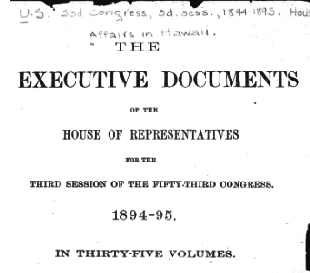
THE ORGANIC ACT HISTORICAL DOCUMENTS READ ALL
Hawaii Organic Act:
Congressional debates on Hawaii Organic Act,
together with debates and congressional action on other matters concerning the Hawaiian Islands
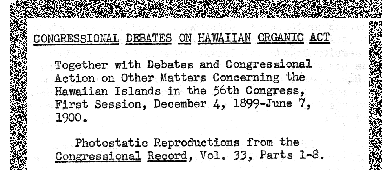
BE EDUCATED LOOK TO THE LISTS FOR YOUR OHANA AND TESTIFY WITH DIGNITY
 |
| THE FIVE QUESTIONS THEY ARE ASKING> THERE IS ONLY ONE WE HAVE> WHERE IS THE SECRETARY OF STATE? |
This is going to be a rarity for us. But this time, it is too important to mess around. We swore to keep this a lighthearted pie in your face mess with the messers and smear the smearers kinda blog, to call out hypocritical and smarmists on our fragile little island.
However, this issue demands the utmost seriousness, so we aren't going to engage in our usual fun ranting and dissing critiques of others critiques of critiquing stuff.
Nope, this one is one hella a serious post. And we are going to fill it with facts figures, and true stuff, for the po'e. If you don't know what that means, then you can just sit at the sidelines, and watch. Hamau. This ain't your battle.
To begin with our very senior editorial staff will be writing this one.
We want to begin, by presenting the original names of the Kauai men and women that protested annexation.
We want you to look around in your commu7bnity and look for those names that still exist. Get out your genealogies. Check it out. And then, show up at the meetings here, on Monday and Tuesday, and represent your ohana,and your ohana lines, with dignity, truth and honor. Do not swear, to not scream or shout, or get violent. Your Kupuna did not act like this. They came in their Sunday best. There is nothing wrong with dressing in a traditional manner, that should be encouraged, and by all menas bring signs. But don't put swear words on them, and do not swear, or make threats while wearing malo, or other sacrfed items. THis demeans what they are and what they mean.They had excellent manners and deportment, but where forceful thoughtful and passionate in their speech. Ali'is did not yell, scream, and swear. They acted in a dignified manner to represent the dignity of the Hawaiian people, and their affront at being annexed. Try to control the bad stuff, and bring forward the good stuff.
Here are the official lists, in the official document, with the original photocopy of those documents:
Kue: The Hui Aloha Aina Anti-Annexation Petitions, 1897-1898

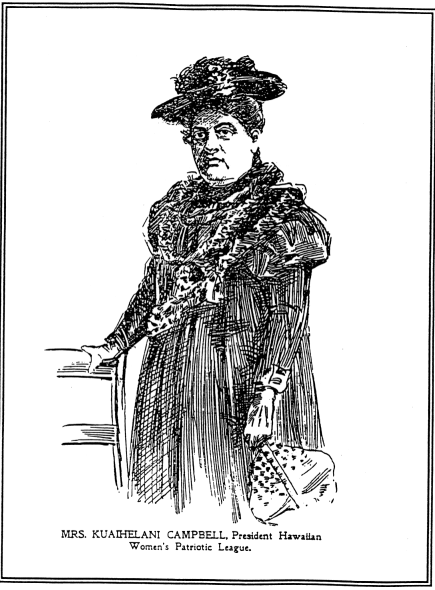
NA KANE
Men
APANA O LIHUE (District of Lihue)
MOKUPUNI O KAUAI (Island of Kauai)
Sept. 11th 1897
APANA O LIHUE (District of Lihue)
MOKUPUNI O KAUAI (Island of Kauai)
Sept. 11th 1897
Enoch Johnson, Secretary -- James Keauiluna Kaulia, President
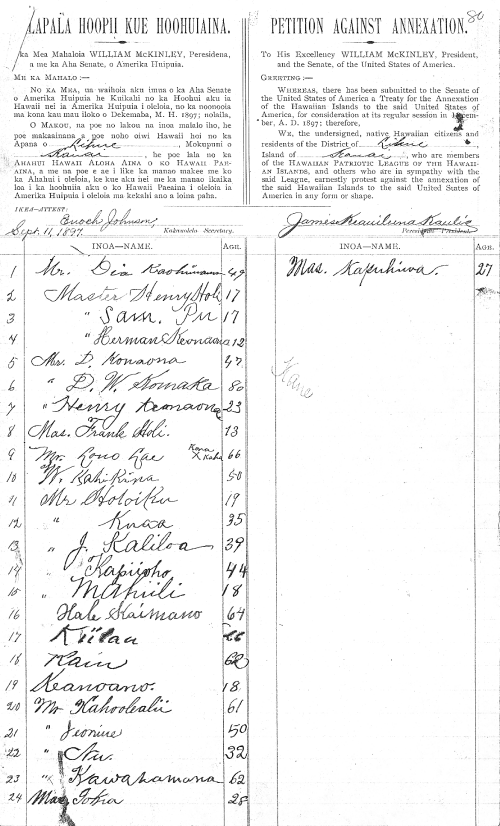
Men
APANA O LIHUE (District of Lihue)
MOKUPUNI O KAUAI (Island of Kauai)
Sept. 11th 1897
APANA O LIHUE (District of Lihue)
MOKUPUNI O KAUAI (Island of Kauai)
Sept. 11th 1897
Enoch Johnson, Secretary -- James Keauiluna Kaulia, President
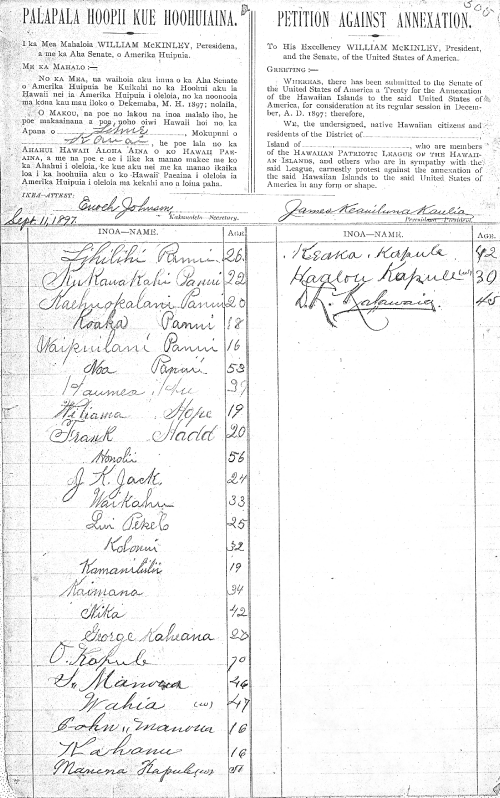
Men
APANA O LIHUE (District of Lihue)
MOKUPUNI O KAUAI (Island of Kauai)
Sept. 11th 1897
APANA O LIHUE (District of Lihue)
MOKUPUNI O KAUAI (Island of Kauai)
Sept. 11th 1897
Enoch Johnson, Secretary -- James Keauiluna Kaulia, President
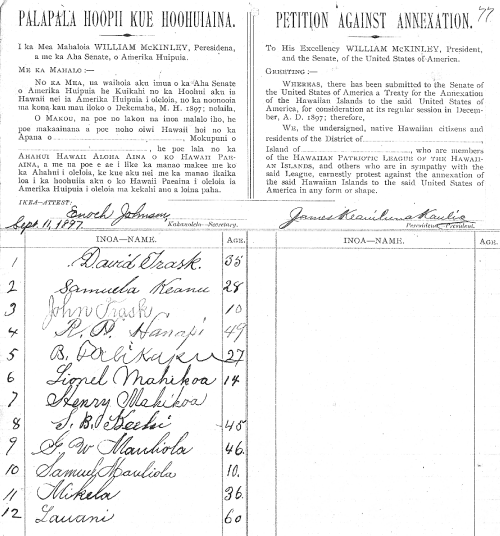
Men
APANA O LIHUE (District of Lihue)
MOKUPUNI O KAUAI (Island of Kauai)
Sept. 11th 1897
APANA O LIHUE (District of Lihue)
MOKUPUNI O KAUAI (Island of Kauai)
Sept. 11th 1897
Enoch Johnson, Secretary -- James Keauiluna Kaulia, President
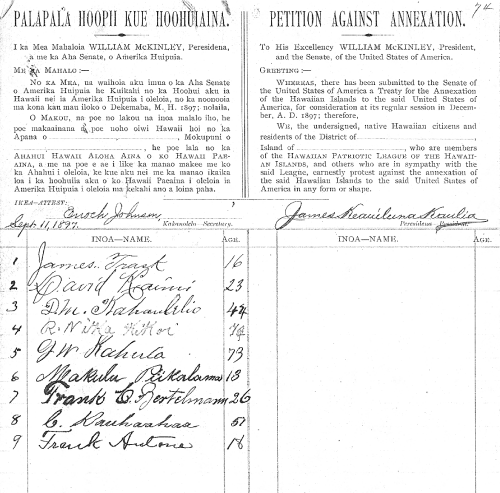
Men
APANA O HANAPEPE (District of Hanapepe)
MOKUPUNI O KAUAI (Island of Kauai)
Sept. 11th 1897
APANA O HANAPEPE (District of Hanapepe)
MOKUPUNI O KAUAI (Island of Kauai)
Sept. 11th 1897
Enoch Johnson, Secretary -- James Keauiluna Kaulia, President
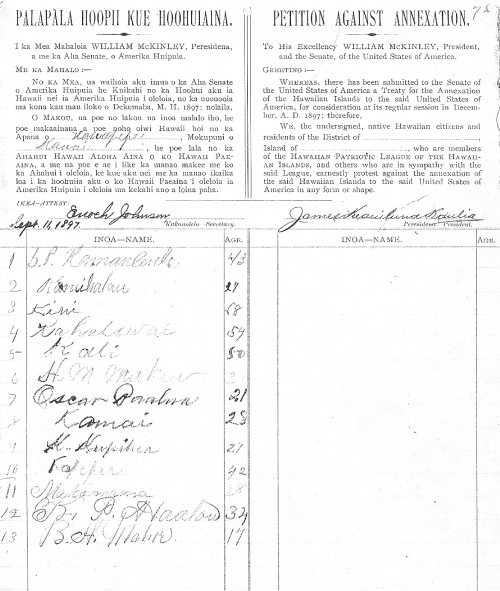
Men
APANA O HANAPEPE (District of Hanapepe)
MOKUPUNI O KAUAI (Island of Kauai)
Sept. 11th 1897
APANA O HANAPEPE (District of Hanapepe)
MOKUPUNI O KAUAI (Island of Kauai)
Sept. 11th 1897
Enoch Johnson, Secretary -- James Keauiluna Kaulia, President
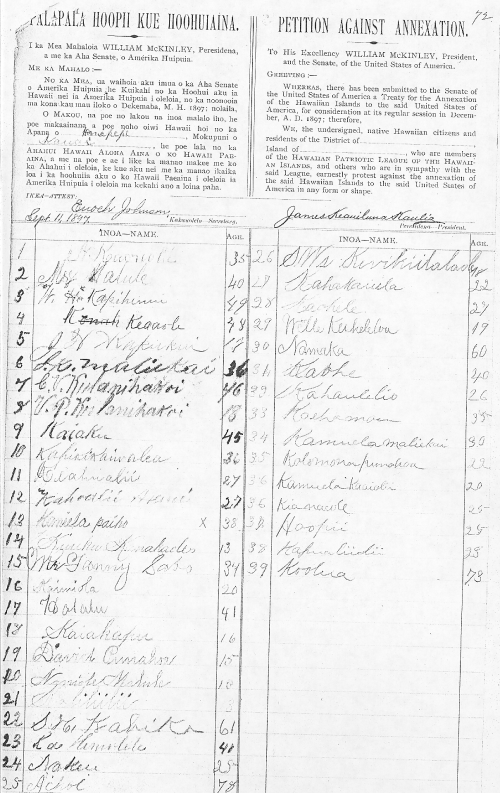
Men
APANA O HANAPEPE (District of Hanapepe)
MOKUPUNI O KAUAI (Island of Kauai)
Sept. 11th 1897
APANA O HANAPEPE (District of Hanapepe)
MOKUPUNI O KAUAI (Island of Kauai)
Sept. 11th 1897
Enoch Johnson, Secretary -- James Keauiluna Kaulia, President
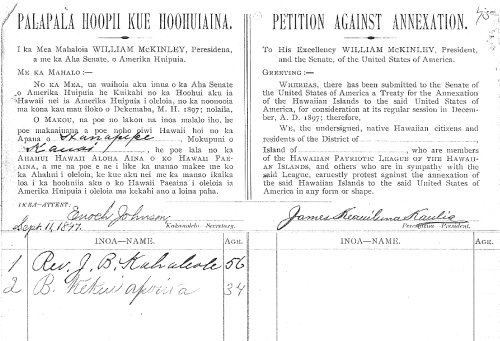
Men
APANA O WAIMEA (District of Waimea)
MOKUPUNI O KAUAI (Island of Kauai)
Sept. 11th 1897
APANA O WAIMEA (District of Waimea)
MOKUPUNI O KAUAI (Island of Kauai)
Sept. 11th 1897
Enoch Johnson, Secretary -- James Keauiluna Kaulia, President
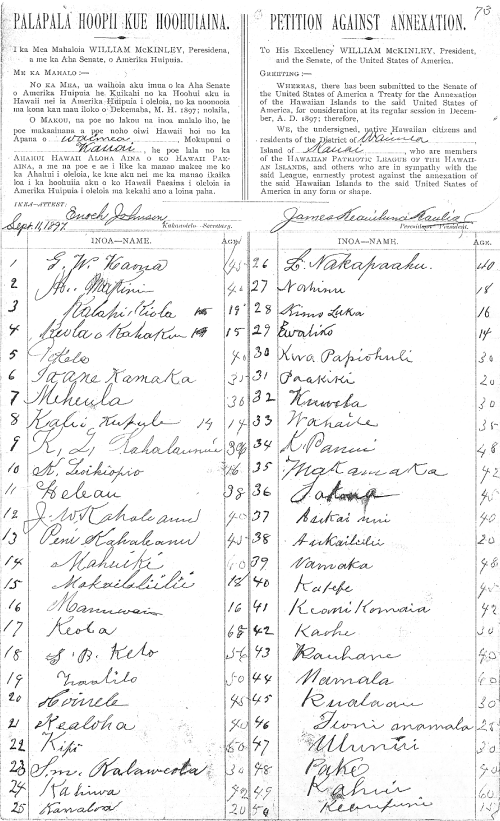
Men
APANA O WAIMEA (District of Waimea)
MOKUPUNI O KAUAI (Island of Kauai)
Sept. 11th 1897
APANA O WAIMEA (District of Waimea)
MOKUPUNI O KAUAI (Island of Kauai)
Sept. 11th 1897
Enoch Johnson, Secretary -- James Keauiluna Kaulia, President
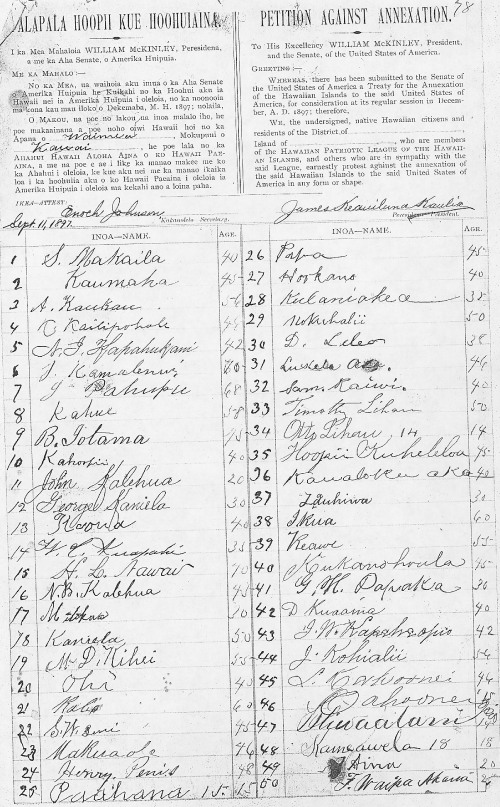
Men
APANA O HANALEI (District of Hanalei)
MOKUPUNI O KAUAI (Island of Kauai)
Sept. 11th 1897
APANA O HANALEI (District of Hanalei)
MOKUPUNI O KAUAI (Island of Kauai)
Sept. 11th 1897
Enoch Johnson, Secretary -- James Keauiluna Kaulia, President
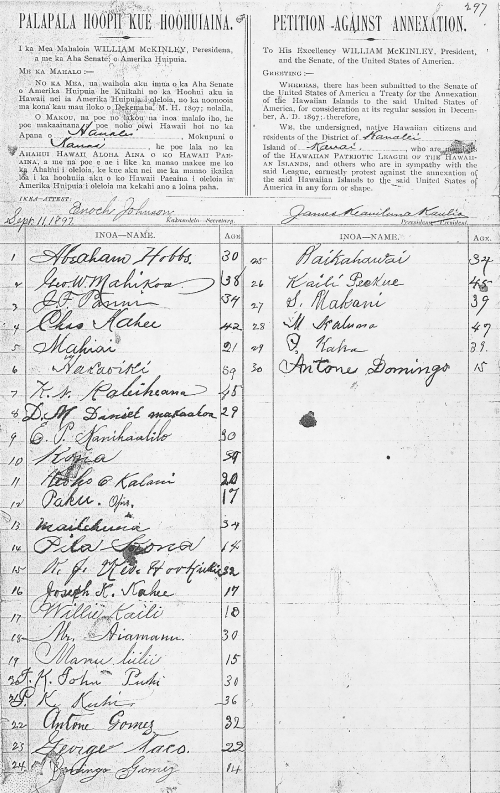
Men
APANA O KAWAIHAU (District of Kawaihau)
MOKUPUNI O KAUAI (Island of Kauai)
Sept. 11th 1897
APANA O KAWAIHAU (District of Kawaihau)
MOKUPUNI O KAUAI (Island of Kauai)
Sept. 11th 1897
Enoch Johnson, Secretary -- James Keauiluna Kaulia, President
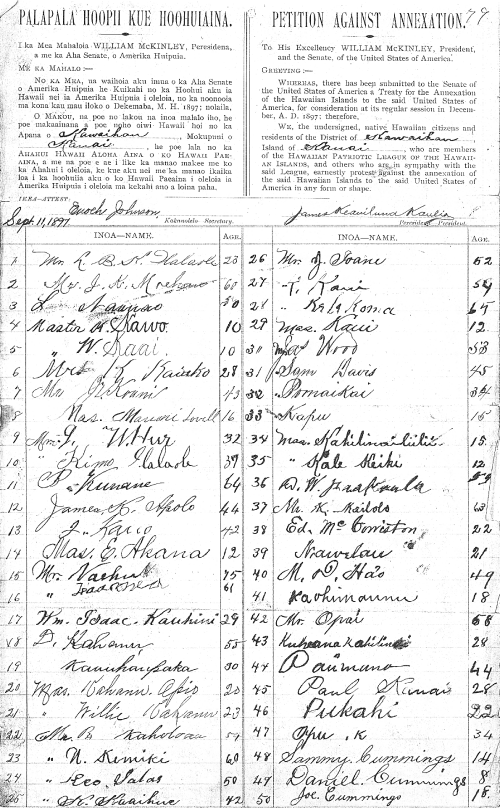
Men
APANA O KAWAIHAU (District of Kawaihau)
MOKUPUNI O KAUAI (Island of Kauai)
Sept. 11th 1897
APANA O KAWAIHAU (District of Kawaihau)
MOKUPUNI O KAUAI (Island of Kauai)
Sept. 11th 1897
Enoch Johnson, Secretary -- James Keauiluna Kaulia, President
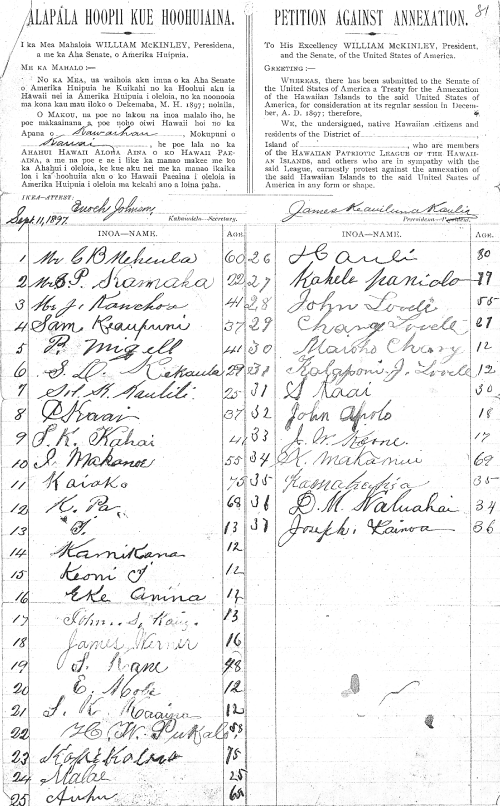
Men
APANA O KAWAIHAU (District of Kawaihau)
MOKUPUNI O KAUAI (Island of Kauai)
Sept. 11th 1897
APANA O KAWAIHAU (District of Kawaihau)
MOKUPUNI O KAUAI (Island of Kauai)
Sept. 11th 1897
Enoch Johnson, Secretary -- James Keauiluna Kaulia, President
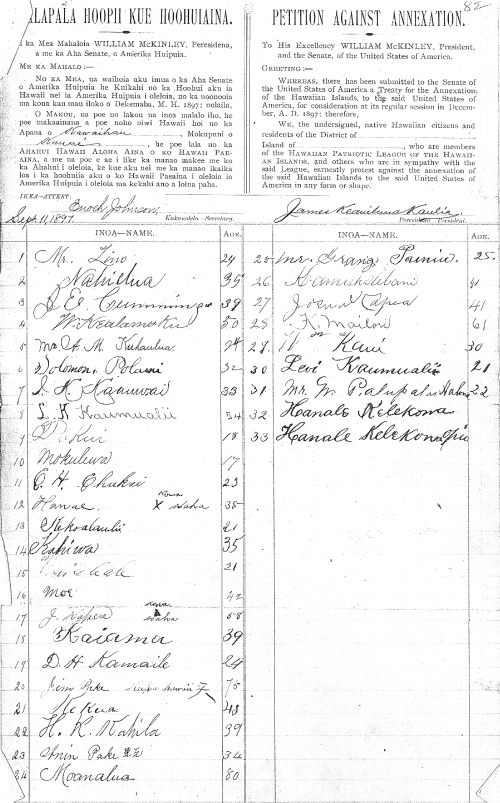
NA WAHINE
Women
APANA O Lihue (District of Lihue)
MOKUPUNI O KAUAI (Island of Kauai)
Sept. 11th 1897
APANA O Lihue (District of Lihue)
MOKUPUNI O KAUAI (Island of Kauai)
Sept. 11th 1897
Mrs. Lilia Aholo, Secretary -- Mrs. Kuaihelani Campbell, President
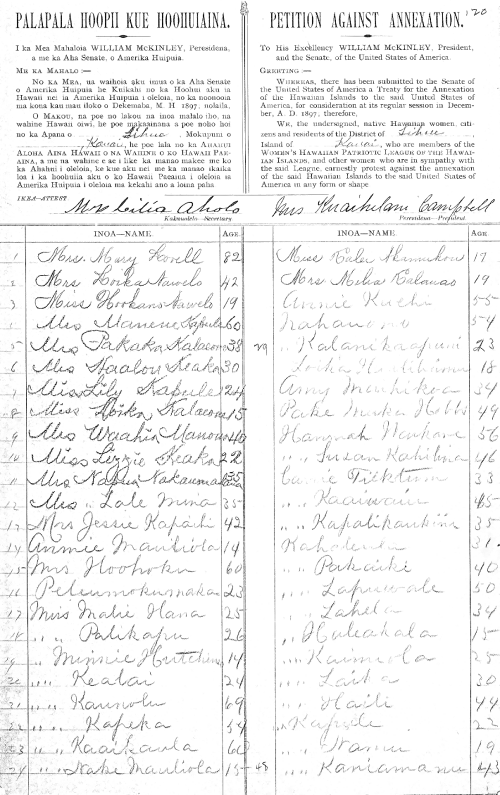
Women
APANA O KOLOA (District of Koloa)
MOKUPUNI O KAUAI (Island of Kauai)
Sept. 11th 1897
APANA O KOLOA (District of Koloa)
MOKUPUNI O KAUAI (Island of Kauai)
Sept. 11th 1897
Mrs. Lilia Aholo, Secretary -- Mrs. Kuaihelani Campbell, President
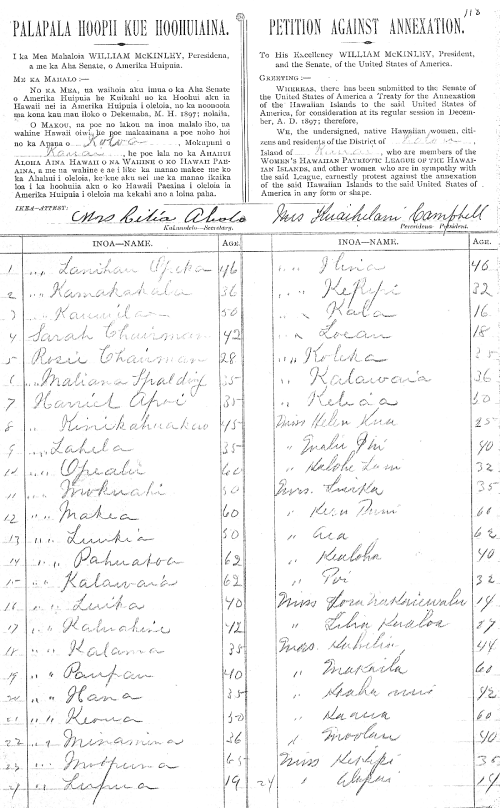
Women
APANA O HANAPEPE (District of Hanapepe)
MOKUPUNI O HAWAII (Island of Hawaii)
Sept. 11th 1897
APANA O HANAPEPE (District of Hanapepe)
MOKUPUNI O HAWAII (Island of Hawaii)
Sept. 11th 1897
Mrs. Lilia Aholo, Secretary -- Mrs. Kuaihelani Campbell, President
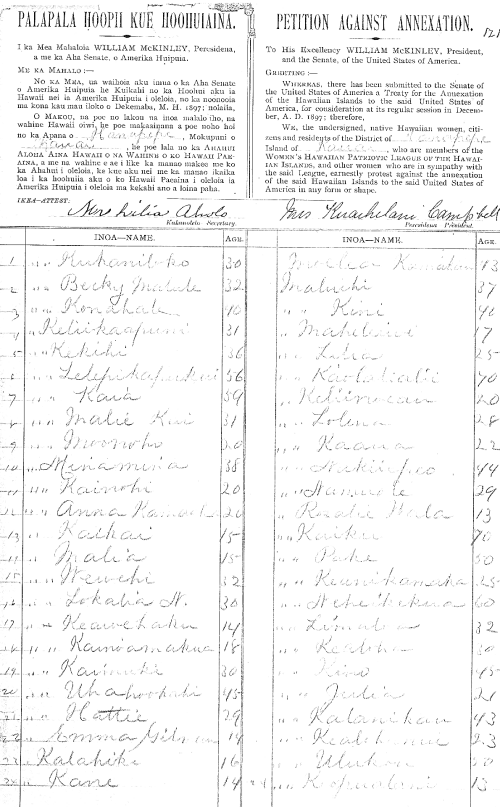
Women
APANA O HANAPEPE (District of Hanapepe)
MOKUPUNI O Kauai (Island of Kauai)
Sept. 11th 1897
APANA O HANAPEPE (District of Hanapepe)
MOKUPUNI O Kauai (Island of Kauai)
Sept. 11th 1897
Mrs. Lilia Aholo, Secretary -- Mrs. Kuaihelani Campbell, President
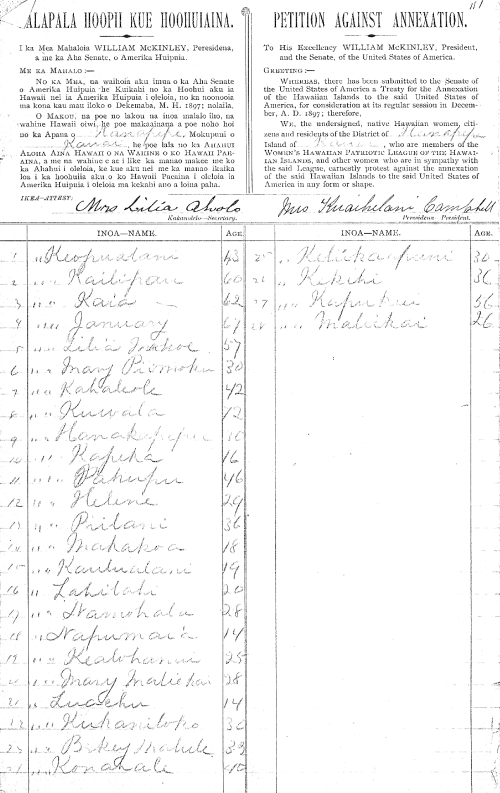
Women
APANA O WAIMEA (District of Waimea)
MOKUPUNI O KAUAI (Island of Kauai)
Sept. 11th 1897
APANA O WAIMEA (District of Waimea)
MOKUPUNI O KAUAI (Island of Kauai)
Sept. 11th 1897
Mrs. Lilia Aholo, Secretary -- Mrs. Kuaihelani Campbell, President
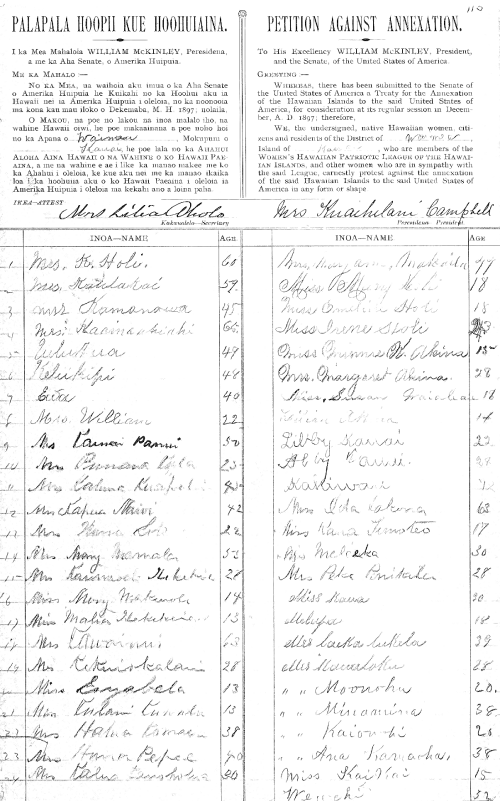
Women
APANA O WAIMEA (District of Waimea)
MOKUPUNI O KAUAI (Island of Kauai)
Sept. 11th 1897
APANA O WAIMEA (District of Waimea)
MOKUPUNI O KAUAI (Island of Kauai)
Sept. 11th 1897
Mrs. Lilia Aholo, Secretary -- Mrs. Kuaihelani Campbell, President
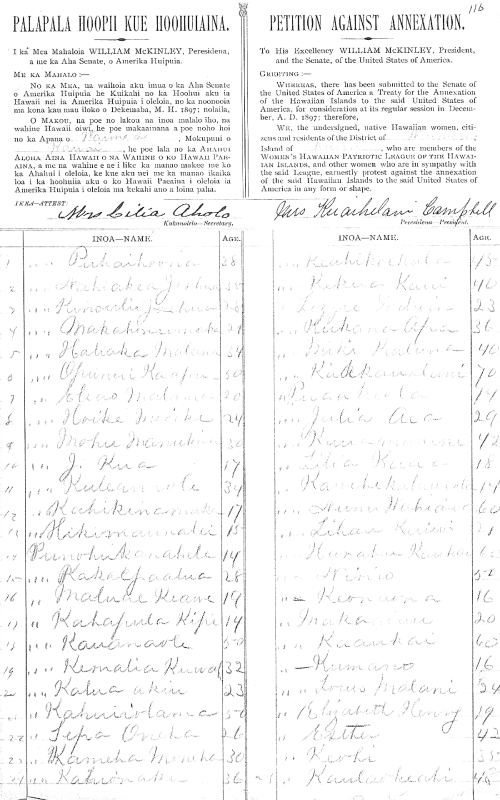
Women
APANA O WAIMEA (District of Waimea)
MOKUPUNI O KAUAI (Island of Kauai)
Sept. 11th 1897
APANA O WAIMEA (District of Waimea)
MOKUPUNI O KAUAI (Island of Kauai)
Sept. 11th 1897
Mrs. Lilia Aholo, Secretary -- Mrs. Kuaihelani Campbell, President
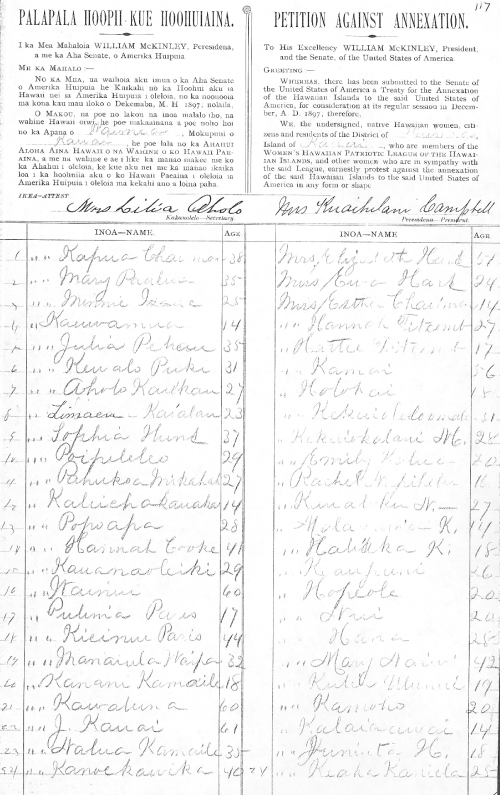
REPRINT OF ARTICLE LATEST AND WELL WRITTEN FROM KINGDOM OF HAWAII NEWS:
Testimonies to the U.S. Department of Interior Eerily Similar to Voices of the Past

The hearings held by the U.S. Department of Interior throughout the Hawaiian Islands are attracting both Hawaiians and non-Hawaiians to give testimony—the sleeping giant has awakened. What is astonishing is the level of legal sophistication and historical accuracies displayed by those giving their testimony. Combined with emotions, these testimonies are eerily similar to the voices of Hawaiians documented in an article in the September 30, 1897 publication of the San Francisco Call newspaper.
This is a re-posting of a blog entry on January 29, 2014.
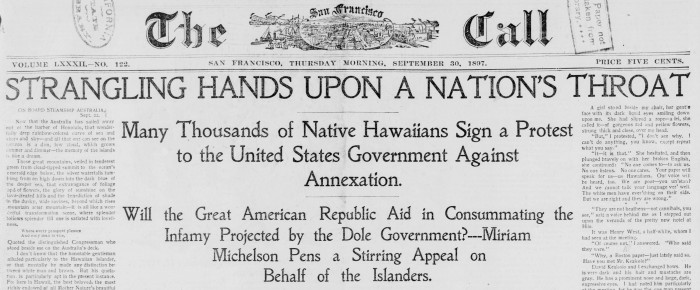
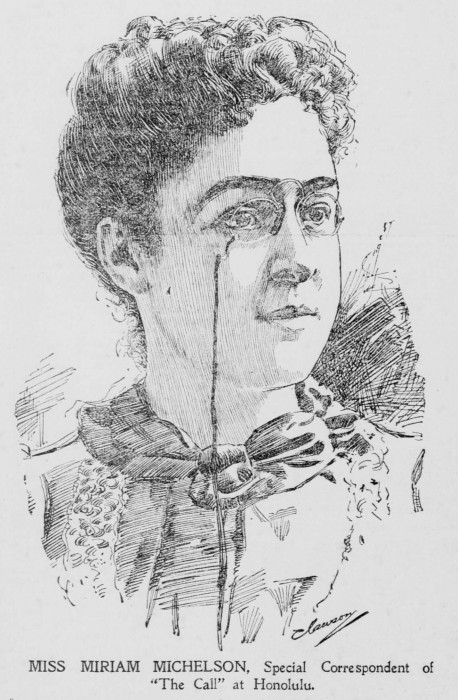 The article was published and authored by Miriam Michelson who
was an American journalist and writer. It was written as Michelson was
leaving Honolulu harbor on board the Steamship Australia heading to San
Francisco. Michelson was sent to the Hawaiian Islands to do a story on
annexation. Her story centers on a signature petition against
annexation being gathered throughout the islands by the Hawaiian
Patriotic League (Hui Aloha ‘Aina) and she bears witness to one of those
meetings in the city of Hilo on the Island of Hawai‘i.
The article was published and authored by Miriam Michelson who
was an American journalist and writer. It was written as Michelson was
leaving Honolulu harbor on board the Steamship Australia heading to San
Francisco. Michelson was sent to the Hawaiian Islands to do a story on
annexation. Her story centers on a signature petition against
annexation being gathered throughout the islands by the Hawaiian
Patriotic League (Hui Aloha ‘Aina) and she bears witness to one of those
meetings in the city of Hilo on the Island of Hawai‘i.It is a powerful article that speaks to the issue of annexation from the Hawaiian perspective and the article’s title clearly speaks to the veracity of what the reader will read. Not known at the time, however, was whether or not the signature petitions would prevent the United States Senate from ratifying the so-called treaty of
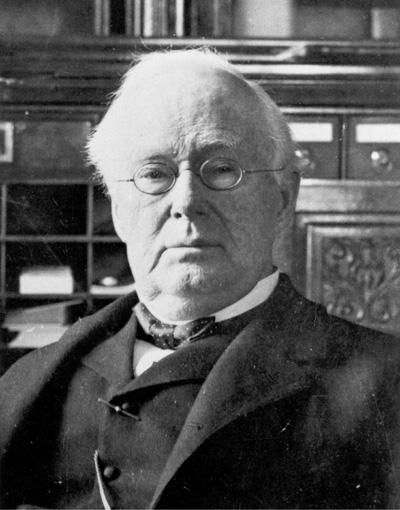 annexation.
Before the Senate convened in December of 1897, officers of the
Hawaiian Patriotic League and the Hawaiian Political Association
traveled to Washington, D.C. and met with Senator George Hoar of
Massachusetts. Senator Hoar agreed to submit the signature petition
onto the record of the Senate when it convened, and by March of 1898,
the signature petition successfully killed the treaty as the Senate was unable to garner enough votes for ratification.
annexation.
Before the Senate convened in December of 1897, officers of the
Hawaiian Patriotic League and the Hawaiian Political Association
traveled to Washington, D.C. and met with Senator George Hoar of
Massachusetts. Senator Hoar agreed to submit the signature petition
onto the record of the Senate when it convened, and by March of 1898,
the signature petition successfully killed the treaty as the Senate was unable to garner enough votes for ratification.Here follows a snippet of the article, which is quite lengthy, but you can read it in its entirety by going to this link and downloading the entire article in PDF format. “Strangling Hands Upon A Nations Throat”
*****************************************************
The strongest memory I have of the islands is connected with the hall
of the Salvation Army at Hilo, on the Island of Hawaii. It’s a crude
little place, which holds about 300 people, I should think. The rough,
uncovered rafters show above, and the bare walls are relieved only by
Scriptural admonitions in English and Hawaiian:“Boast not thyself of to-morrow.” “Without Christ there is no salvation.”
As I entered, the bell on the foreign church, up on one of the beautiful Hilo hills, was striking ten. The place was packed with natives, and outside stood a patient crowd unable to enter. It was a women’s meeting, but there were many men present. The women were dressed in Mother Hubbards of calico or cloth and wore sailor hats—white or black. The men were in coats and trousers of American make.
Presently the crowd parted and two women walked in, both very tall, dressed in handsome free-flowing trained gowns of black crepe-braided in black. They wore black kid gloves and large hats of black straw with black feathers. The taller of the two—a very queen in dignity and repose—wore nodding red roses in her hat, and about her neck and falling to the waist a long, thick necklace of closely strung, deep-red, coral-like flowers, with delicate ferns interspersed.
This was Mrs. Kuaihelani Campbell, the president of the Women’s Hawaiian Patriotic League. Her companion was the secretary of the branch in Hilo.
It was almost pitiful to note the reception of these two leaders—the dumb, almost adoring fondness in the women’s eyes; the absorbed, close interest in the men’s dark heavy faces.
After the enthusiasm had subsided the minister of the Hawaiian church arose. He is tall, blonde, fair faced, three-quarters white, as they say here. Clasping his hands in front and looking down over the bowed dark heads before him he made the short opening prayer. He held himself well, his sentences were short and his manner was simple.
There is something wonderfully effective in earnest prayer delivered in an ancient language with which one is unfamiliar. One hears not words, but tones. His feelings, not his reason, are appealed to. Freed of the limiting effects of stereotyped phrases the imagination supplies the sense. Like the Hebrew and the Latin the Hawaiian tongue seems to touch the primitive sources of one’s nature, to strip away the complicated armor with which civilization and worldliness have clothed us and to leave the emotions bare for that wonderful instrument, a man’s deep voice, to play upon.
The minister closed and a deep murmuring “Amen” from the people followed.
I watched Mrs. Emma Nawahi curiously as she rose to address the people. I have never heard two women talk in public in quite the same way. Would this Hawaiian woman be embarrassed or timid, or self-conscious or assertive?
Not any of these. Her manner had the simple directness that made Charlotte Perkins Stetson, two years ago, the most interesting speaker of the Woman’s Congress. But Mrs. Stetson’s pose is the most artistic of poses—a pretense of simplicity. This Hawaiian woman’s thoughts were of her subject, not of herself. There was an interesting impersonality about her delivery that kept my eyes fastened upon her while the interpreter at my side whispered his translation in short, detached phrases, hesitating now and then for a word, sometimes completing the thought with a gesture.
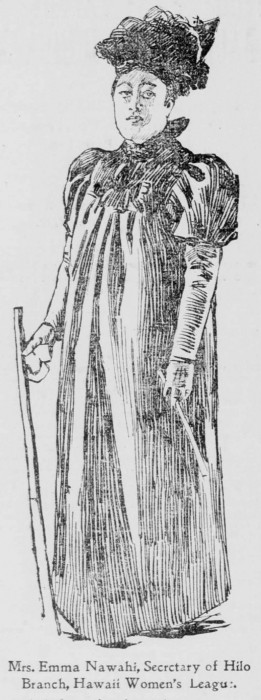 “We
are weak people, we Hawaiians, and have no power unless we stand
together,” read Mrs. Nawahi, frequently raising her eyes from her paper
and at times altogether forgetting it.
“We
are weak people, we Hawaiians, and have no power unless we stand
together,” read Mrs. Nawahi, frequently raising her eyes from her paper
and at times altogether forgetting it.“The United States is just—a land of liberty. The people there are the friends, the great friends of the weak. Let us tell them—let us show them that as they love their country and would suffer much before giving it up, so do we love our country, our Hawaii, and pray that they do not take it from us.”
“Our one hope is in standing firm—shoulder to shoulder, heart to heart. The voice of the people is the voice of God. Surely that great country across the ocean must hear our cry. By uniting our voices the sound will be carried on so they must hear us.”
“In this petition, which we offer for your signature to-day, you, women of Hawaii, have a chance to speak your mind. The men’s petition will be sent on by the men’s club as soon as the loyal men of Honolulu have signed it. There is nothing underhand, nothing deceitful in our way—our only way—of fighting. Everybody may see and may know of our petition. We have nothing to conceal. We have right on our side. This land is ours—our Hawaii. Say, shall we lose our nationality? Shall we be annexed to the United States? Aole loa. Aole loa.”
It didn’t require the interpreter’s word to make me understand the response. One could read negation, determination in every intent, dark face.
“Never!’ they say,” the man beside me muttered. “Never! they say. ‘No! No!’ they say-”
But the presiding officer, a woman, was introducing Mrs. Campbell to the people. Her large mouth parted in a pleased smile as the men and women stamped and shouted. She spoke only a few words, good-naturedly, hopefully. Once its seemed as though she were talking them all in her confidence, so sincere and soft was her voice as she leaned forward.
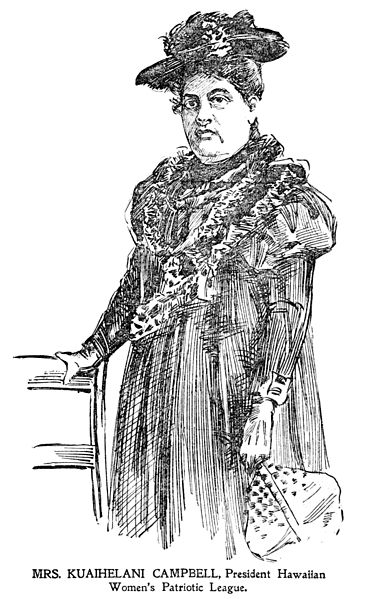 “Stand
firm, my friends. Love of country means more to you and to me than
anything else. Be brave; be strong. Have courage and patience. Our time
will come. Sign this petition—those of you who love Hawaii. How many—how
many will sign?”
“Stand
firm, my friends. Love of country means more to you and to me than
anything else. Be brave; be strong. Have courage and patience. Our time
will come. Sign this petition—those of you who love Hawaii. How many—how
many will sign?”She held up a gloved hand as she spoke, and in a moment the palms of hundreds of hands were turned toward her.
They were eloquent, those deep lined, broad, dark hands, with their short fingers and worn nails. They told of poverty, of work, of contact with the soil they claim. The woman who presided had said a few words to the people, when all at once I saw a thousand curious eyes turned upon me.
“What is it?” I asked the interpreter. “What did she say?”
He laughed. “‘A reporter is here,’ she says. She says to the people, ‘Tell how you feel. Then the Americans will know. Then they may listen.’”
A remarkable scene followed. One by one men and women rose and in a sentence or two in the rolling, broad voweled Hawaiian made a fervent profession of faith.
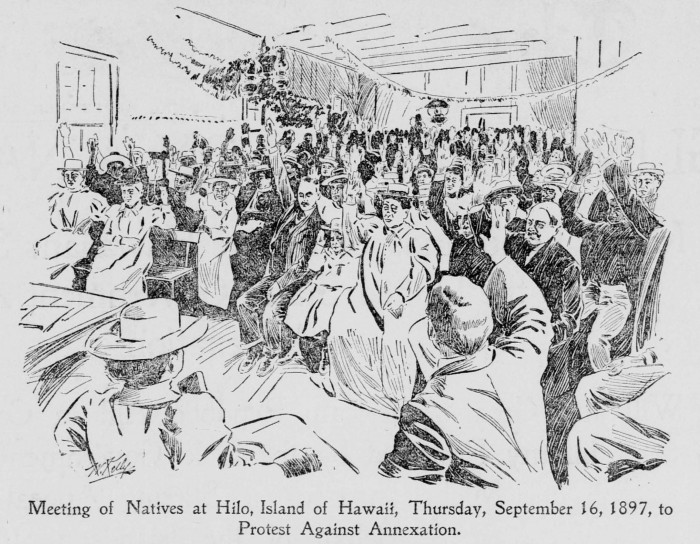
“My feeling,” declared a tall, broad-shouldered man, whose dark eyes were alight with enthusiasm. “This is my feeling: I love my country and I want to be independent—now and forever.”
“And my feeling is the same,” cried a stout, bold-faced woman, rising in the middle of the hall. “I love this land. I don’t want to be annexed.”
“This birthplace of mine I love as the American loves his. Would he wish to be annexed to another, greater land?”
“I am strongly opposed to annexation. How dare the people of the United States rob a people of their independence?”
“I want the American Government to do justice. America helped to dethrone Liliuokalani. She must be restored. Never shall we consent to annexation!”
“My father is American; my mother is pure Hawaiian. It is my mother’s land I love. The American nation has been unjust. How could we ever love America?”
“Let them see their injustice and restore the monarchy!” cried an old, old woman, whose dark face framed in its white hair was working pathetically.
“If the great nations would be fair they would not take away our country. Never will I consent to annexation!”
“Tell America I don’t want annexation. I want my Queen,” said the gentle voice of a woman.
“That speaker is such a good woman,” murmured the interpreter. “A good Christian, honest, kind and charitable.”
“I’m against annexation—myself and all my family.”
“I speak for those behind me,” shouted a voice from far in the rear. “They cannot come in—they cannot speak. They tell me to say, ‘No annexation. Never.’”
I am Kauhi of Kalaoa. We call it Middle Hilo. Our club has 300 members. They have sent me here. We are all opposed to annexation—all—all!”
He was a young man. His open coat showed his loose dark shirt; his muscular body swayed with excitement. He wore boots that came above his knees. There was a large white handkerchief knotted about his brown throat, and his fine head, with its intelligent eyes, rose from his shoulders with a grace that would have been deerlike were it not for its splendid strength.
“I love my country and oppose annexation,” said a heavy-set, gray-haired man with a good, clear profile. “We look to America as our friend. Let her not be our enemy!”
“Hekipi, a delegate from Molokai to the league, writes: ‘I honestly assert that the great majority of Hawaiians on Molokai are opposed to annexation. They fear that if they become annexed to the United States they will lose their lands. The foreigners will reap all the benefit and the Hawaiians will be placed in a worse position than they are to-day.”
“I am a mail carrier. Come with me to my district.” A man who was sitting in the first row rose and stretched out an appealing hand. “Come to my district. I will show you 2000 Hawaiians against annexation.”
“I stand—we all stand to testify to our love of our country. No flag but the Hawaiian flag. Never the American!”
There was cheering at this, and the heavy, sober, brown faces were all aglow with excited interest.
I sat and watched and listened.
At Honolulu I had asked a prominent white man to give me some idea of the native Hawaiian’s character.
“They won’t resent anything,” he said, contemptuously. “They haven’t a grain of ambition. They can’t feel even envy. They care for nothing but easy and extremely simple living. They have no perseverance, no backbone. They’re unfit.”
Yet surely here was no evidence of apathy, of stupid forbearance, of characterless cringing.
These men and women rose quickly one after another, one interrupting the other at times, and then standing expectantly waiting his turn—too simple, too sincere, it seemed to me, to feel self-conscious or to study for a moment about the manner of his speech, so vital was the matter delivered.
They stood as all other Hawaiians stand—with straight shoulders splendidly thrown back and head proudly poised. Some held their roughened, patient hands clasped, some bent and looked toward me, as though I were a sort of magical human telephone and phonograph combined.
I might misunderstand a word or two of the interpreted message, but there was no mistaking those earnest, brown faces and beseeched dark eyes, which seemed to try to bridge the distance my ignorance of their language and their slight acquaintance with mine created between us.
I verily believe that even the most virulent of annexationists would have thought these Hawaiians human; almost worthy of consideration.
The people rose now and sang the majestic Hawaiian National Hymn. It was sung fervently, a full, deep chorus of hundreds of voices. The music is beautifully characteristic, with its strong, deep bass chords to which the women’s plaintive, uncultivated voices answer. Then there was a benediction, and the people passed out into the muddy street.
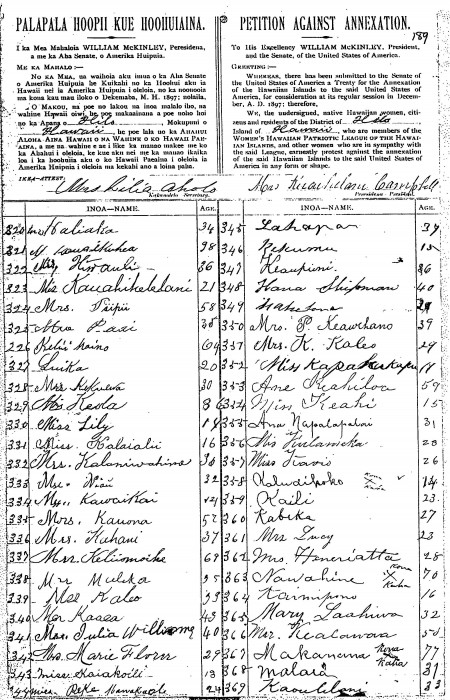
NOTE ON ABOVE ARTICLE: The quotes and writing are some from the ORIGINAL Anti- Annexation meetings. As you can see, at that time in the History, racism was overt and rampant. This was just after the Civil War. people were still extremely racist. Has the rhetoric changed that much from the past? Do people still think that Hawaiians are uneducated, druggie, lazy no good and stupid? Yes. We have pointed it out time and time and time again, especially on some blogs we have perused and commented on. YES. People STILL feel this way about the Po'e of Hawaii Nei. Therefore, with this exact sentiment still around, how can the poeple expect to be treated as equals that can run their own affairs? Bottom line, they cannot. First, this racism MUST be addressed, and the self deprecation of the people be erased. Second, the issue of National Sovereignty Must be addressed by the correct entities. Then and only then, can the Nation restore ITSELF!
*Anonymous guest blogger*
As you can see, as today, it is the women that are the most engaged in the process. The people of Kauai were coming out and standing strong long before anyone else got here, and way before anyone thought of calling these people "fistees", or "sellouts", or "trust fund babies". Many of these ohana, are PURE Hawaiian, but some are are mixed blood and hapa haole decendents of Alii and Haole, from all countries, not just the United States, but Russia, England, Scotland, Ireland, and Portugal, China, Japan. The Filipino Population was not very predominate at this time, with more Puerto Ricans here.. Many Koko'ole supported the cause to fight annexation.So, it is perfectly appropriate that hanais, mothers, fathers, and tutus, aunties and uncles who do not have koko speak on this matter as well, since they are connected and attached to the families through birth, marriage in law or hanai. This is perfectly acceptable.
These names are still alive and well on Kaua'i, and each and every one of the descendents of each and every person on these petitions deserves you to get to those meetings, and with dignity, intelligence, and pride, state the case that the department of the interior is the incorrect body to address the people on this issue. Your Kupuna clearly would want the department of state to address this issue, and not the department of the interior, and emphatically would not have wanted to be a "tribe", or a "tribal Government", but would be fighting to restore the Hawaiian Kingdom, and the Hawaiian Government. Many Non Hawaiians were members of the Hawaiian Nation. Please remember that when you are testifying on this issue. Please be educated and informed. The people of Kauai have a strong reputation, and we want to keep that intact. We know the history, the genealogies and the culture. let us not slip backwards, but glide forward.
No Native Hawaiians want to be a "tribe" or "tribal government". These were not "tribes". This was a legitimate, seated, law abiding country which was illegally annexed by the United States. This was not a Native American Indian tribe, or band. The lines of secession were completely different, the culture is completely different, the understanding of "native" is completely different, the governance is completely different. In Hawaii, the Kingdom of Hawaii recognized all po'e (people) as it's citizens, under the protection of the native Hawaiian Government, no matter if they were "ex pats" from somewhere else and held "dual citizenship.".
The responsibility of the Monarchy, like all Kings and Queens that rule a country and a nation of poeple, had to provide for all citizens, regardless of national origin, skin color or race.
However, the issue of Koko(blood) predominates the right to rule, and to have favor, as the original aboriginal peoples here, prior to the arrival of Captian Cook, Captain Vancouver, and others who may or may not have arrived prior to them. These are the poeple whose needs and rights are foremost, and tier descendants, and those for whom they call "Ohana", and that includes Hanai as well., as that was a true classification of person, although not always of koko, accepted, with full rights.
Our Heir apparent, was Princess Kaiulani, who was half white, whose father was a Scott Archibald Cleghorn. According to the will of the Queen, if she died *which she did,m at the age of 22*, the throne would revert to the House of Kawananakoa, which still resides here, on the island of Kauai, with the Ka'auwai ohana, and with Princess Abigail, and her cousins son, Quentin Kawananakoa, who was recognized by the Untied States government and many other counties as the heir apparent to the Hawaiiian nation.
The department of the interior, does not have the ultimate jurisdiction to solve the core of the matter of the nation of hawaii, that lies within the department of State.
It was Mr Blount who served in that capacity, and it is Mr. John Kerry who serves in that capacity today. It is only through this department, treaties and negotiations must occur, as a nation to nation conversation.
The Department of the Interior, coming to the forefront as the correct entity is incorrect, and is inflaming the people against the ideas being proposed, because native Hawaiian people have a strong national identity to ka Pae Aina, or the Country of Hawaii, not specific clans or tribal affiliations, and certainly no native Hawaiian wants to be placed into a "reservation" situation.
We also feel, that the Native American community feels similarly, and sees the Native Hawaiian question as unique and distinguished from their own, and also understands the sentiment of the Hawaiian pole, and those who claim loyalty to the Sovereignty of the people, and also would support the nation, since it hasn't gone anywhere, The sovereignty of the people has never been in question. The return of the nation is not an issue, as it is still intact.
The only question to be answ3ered is: Will the State Department enter into negotiations with Hawaiian Nationals in regards to their Country, and not seek the tack of the Department of Interior trying to recreate the wheel when the wheel has already been created and in motion for decades.
The queen had a very strong constitution, it is only that, and the restoration of the Hawaiian Kingdom, and the Country of Hawaii that is the only question to be4 asking the department of the interior is when will the Department of State be addressing the people of Hawaii Nei?
THis, is how we, here, are taking this position.
We hope that many will read this post. Put away what this blog has been for fun, and mockery of those who have been a minor thorn in the side of the people.
This writing is serious and in earnest.
Listen. hamau. Wake Up Rise Up Stand Up.
We know where to take this too. Now, all we have to do is let them know we know where the question belongs, and what the answer should be.
We ask, each and every person, to remain calm, cool, dignified, but passionate in the speech without swearing, or getting too wild. If you feel that way take a break. We will not play into the hands of racists, and nay sayers who want to portray ka Po'e Hawaii, and those who love them, or are loved by them in a wrong light.
Now, is our chance and time to respect our Kupuna, and stand as they did, with dignity and honor, with grace, intelligence, and pono and righteous thoughts and words, actions and deeds. There is no other way to be pono.
There is no other way to Shock and Awe.
Amene
With All Due Seriousness
The kauai Snarklectic Staff
Portions of this post were written by a guest writer, who is not kauai Snarklectic Editorial Staff.
We had to bring in the Big Ones for this post.
Mahalo to that guest writer, "Anonymous".

No comments:
Post a Comment
OK, Snarkists here are the rules. You need to show your real name. Or we just ban you. We don't do anon posting here. So you need to have a legit ID.Don't like it, too bad. We don't moderate here. We just simply ban you. All you can do, is take a chance, and see if your post survives to make it onto the blog. But life is a gamble, isn't it? Kinda like when you posted your first snarky comment, kinda gave you a rush, huh? Just think of this in the same way.
Happy Snarkin!